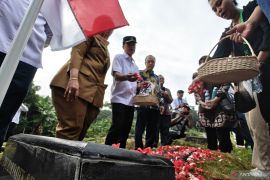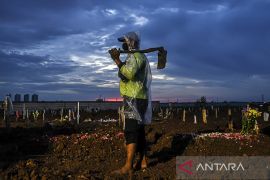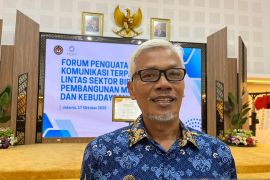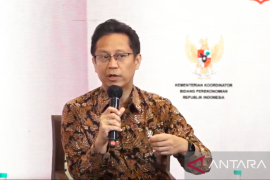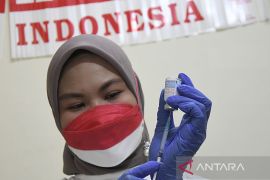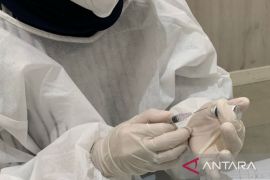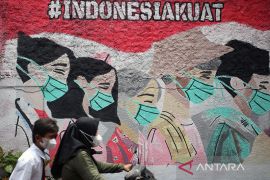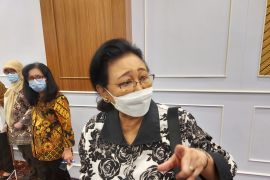The reason: as a woman running a home-based business baking cakes, she rarely steps out of the house. At home, she has the responsibility of caring for her two children, Fauzil, 9, and Fauzia, 4.
After the coronavirus pandemic struck, she rarely ventured into the market to buy ingredients for cakes. Her husband was willing to help her buy all household necessities on the way home from work.
However, even though she was mostly confined at home, she still contracted COVID-19.
Could it be from her husband's work clothes, she wondered after reading up about the SARS-CoV-2 surviving for long periods in porous materials.
While the government has allowed people to return to regular activities under strict health protocols, perhaps, her husband had been lax about washing clothes after work, she thought.
At the beginning of the pandemic, Fitria said her husband would soak his dirty clothes and take a shower as soon as he came home, before interacting with his family. However, over time, he became slack.
After work, her husband no longer went straight to the bathroom to soak his clothes and take a shower, but began chatting and interacting with his family first, said Fitria.
As a journalist, he often visited high-risk places such as Padang Market, which was once the largest COVID-19 cluster in West Sumatra, or the West Sumatra Governor's Office, where several officials were exposed to the virus, she added.
But till today, the source of the virus that infected Fitria remains unclear.
After being exposed to the coronavirus, Fitria suffered severe shortness of breath and had to be hospitalized. She felt dull, lacking in enthusiasm, although her sense of smell and taste were still intact.
A PCR swab test confirmed she had contracted COVID-19. As soon as the test results came out, she was isolated at Unand Hospital; no one could accompany her. Her cellphone served as the sole connection between her and her family.
While under isolation, Fitria's physical and psychological condition remained poor. She would lie in bed because her whole body ached. Only the phone calls from her husband, children, and friends could raise her spirits, she said.
Finally, after 13 days of isolation and two negative PCR test results, Fitria was allowed to go home. Picked up by her husband and two children, she felt really grateful.
Related news: As asymptomatic cases rise, COVID-19 testing gains traction
COVID-19 is like a nightmare that she does not want to go through again, she said. The experience has served as a reminder to her to stop taking health protocols for granted and to be more disciplined in maintaining personal health and hygiene.
She said she believes the government's recommendation on wearing masks can actually reduce the likelihood of being exposed to COVID-19.
Not just herself, Fitria said she would ensure that her family is disciplined in wearing masks. She does not want her children to have a hard time in isolation like her.
“Besides, what is so hard about wearing a mask? Just wear it. Many people sell it at affordable prices,” she said.
Fitria said she will also ensure that her husband rigorously soaks clothes in detergent after work and interacts with this family only after taking a bath.
According to Dr. Andika Chandra Putra, Sp.P, Phd, a pulmonologist at Persahabatan Hospital in Jakarta, wearing a mask can be very effective in blocking the transmission of COVID-19, which spreads via airborne droplets, and controlling the increase in infections.
"Actually, the most important thing in handling this disease is preventing or reducing the risk of transmission. Because if the patient is infected in the hospital, he is already sick. It is more important to reduce the risk of transmission than to let people suffer," he said.
However, he also emphasized that wearing a mask is not enough to reduce transmission risk.
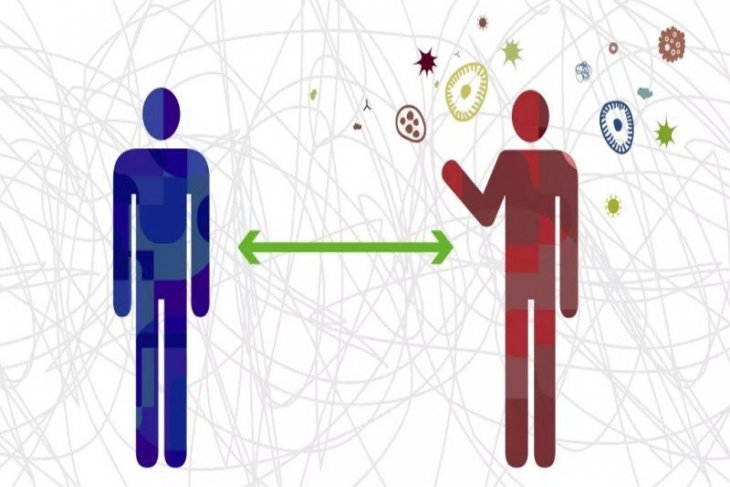
Related news: Office, family, election clusters put focus back on health protocols
Related news: Be wary of office, family, and regional election clusters: Jokowi
Meanwhile, chairperson of the COVID-19 Task Force Health Management, Professor Akmal Taher, reiterated the importance of members of the community protecting family members who are at a high risk of contracting the virus, including infants, toddlers, the elderly, and people with comorbidities.
Moreover, people who have congenital diseases such as diabetes, high blood pressure, and others can be easily infected with the virus. The mortality rate for this group is also higher, he informed.
"This is who we should protect. Or, if someone is forced to leave the house for earning a living, he must be able to look after those who are at high risk," he said.
Logically, ignoring health protocols or high-risk groups would put Indonesian society at a greater health risk.
But, the disciplined observance of health protocols has slowly eroded after the government began to relax restrictions on movement and economic activity in a large number of regions.
Many people are no longer using masks, or wearing them improperly, and have begun gathering in cafes or offices. As a result, instead of falling, the number of cases has increased to cross 4 thousand.
This worrying fact is of course a burden for health workers, who, since the beginning of the pandemic, have been fighting at the forefront to treat patients suffering from COVID-19.
"To deal with COVID-19, the only way is educate them repeatedly by showing evidence and facts. It is difficult, it consumes physical and psychological energy, and we have to be patient, but inevitably we have to return to our duties as doctors," said Dr. Ardina Nur Pramudhita, a resident doctor at the Dr. Kariadi Hospital in Semarang.
Apart from her daily responsibilities at the hospital, Pramudhita also feels great concern and obligation to continue to fortify her family from the dangers of COVID-19.
Feeling that she is at a higher risk of transmitting the virus to her loved ones, Pramudhita strictly adheres to health protocols, both while she at home and while on duty in the hospital.
Starting from bleeding hands from using too much sanitizer, having to eat lunch in the car, to showering and washing clothes immediately after work --- she has been enduring such inconveniences for the past six months.
“So, it really annoys me when a family member goes outside the house, even though there is nothing really important to do, or if you see people not heeding health protocols," she said.
"But to increase awareness, we must build trust between health protocol-makers and the public. Because, if people do not believe in the dangers of COVID, it will be very difficult to build their awareness," Pramudhita said.
Related news: PMI encourages unity of nation's elements amid COVID-19 pandemic
Related news: Indonesians should evince greater caution to slow COVID-19: Red Cross
Editor: Yuni Arisandy Sinaga
Copyright © ANTARA 2020

